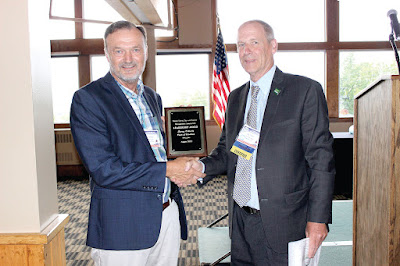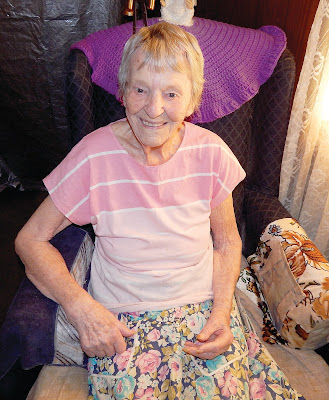When 16-year-old foreign exchange student Kyrylo Perederii arrived in Windham in 2018 to attend Windham High School, he never envisioned returning with his mother, Olena Kriutchenko, and father, Andrii Perederii due to life-altering circumstances.
“When we decided it was time for us to leave Melitopol and we were trying to figure how we would do that, we asked Pam and Bill if Krylylo could stay with them while we were in transition and found a safe place until the war was over,” Olena said. “But Pam and Bill offered their home to all of us. We are very grateful for their kindness in allowing the three of us to stay together.”
However, the decision to leave their home bore relentless challenges.
Before the invasion, Kyrylo was attending Erasmus+ program, a university student exchange curriculum in Turkey. The program began in the fall of 2021 and ended in February. He arrived home on Feb. 12. However, just before his arrival, he started to receive alarming texts from friends in other countries.
When one friend told him that she had heard men 18 years old and older would be called to serve the Ukrainian forces, Kyrylo and his parents became alarmed, and the uncertainty began.
The day after receiving these alarming texts, Russia started a full-scale invasion on Feb. 24.
“The next day, on Feb. 25, we were without electricity and running water and there weren’t cell phone connections for long periods at a time,” Olena said. “We didn’t know how our relatives were doing, they lived on the other side of the city. A lot of tanks were rolling through the city, bombing buildings. Going outside was unsafe, and we had no clue how long we’d have to stay inside our home.”
Olena said that looting became a problem, and food was becoming scarce.
“Luckily, Dad went shopping for food just before the invasion, so we had something to eat for a while,” Kyrylo said. “But when we ran out, we had to stand in long lines to purchase foods from the businesses that officially remained opened.”
Olena said that the Russians helped the shoplifters by ensuring that the “looting happened in an orderly fashion.”
During these early war-torn days, the uncertainty increased, and Kyrylo experienced an epiphany.
“Everything I was working toward, things that I thought were valuable, didn’t mean a thing anymore,” he said. “My plans to make my city a better place didn’t matter, no one will care about being proactive or volunteering now that everything is destroyed. When I made that realization, I just started to cry.”
Leaving family, friends, and their cat and dog added more heartbreak to this crisis, and it took extra strength knowing that the travels to the U.S. would be wrought with more challenges and intimidation. They prepared the best they could by deleting all calls, texts and social media posts that would raise suspicion.
Kyrylo and his parents described intimidating and degrading incidents Ukrainians experienced while crossing the checkpoints.
“There were no toilets and very few bushes to hide behind, so people went to the bathroom at the side of the road without getting too close to the land mines,” Olena said. “People had to wait in line for long periods in 100-degree weather, and Russian soldiers often took personal items that included money, laptops, cell phones, and jewelry without explanation.”
Repeatedly, Ukrainians were asked to remove their clothing so officers could inspect tattoos and hidden items that would favor Ukraine.
The family’s long and risky travel to safety, which began on June 7 and cost the family $1,000, eventually led them to Turkey on June 18 where they stayed with friends for three weeks while they waited for the proper paperwork to live temporarily in the U.S. and at the home of Carter and Allen.
Once the paperwork was filed and all was in order, Krylylo and his parents arrived in Windham on July 14, five weeks after leaving the city they love and call home. But gratitude is their focus.
“It was an amazing feeling to finally reach where we were trying to all this time and actually with people who have helped us so much,” Olena said.
Now that they are here, they are anxious to find work and be contributing members of the Carter and Allen household but must wait once again for the proper paperwork before they can begin working legally.
Krylylo continues to work on his college degree through online coursework while Olena and Andrii, a builder by trade, work to help the Carters with their house and camp projects.
“We always wanted to travel more after we retired, and visiting Maine was at the top of our list,” said Olena, a teacher. “But it was never in our plans to do it this way.”
They were very clear about their next steps and goals.
“To find a job, help people in our country, and return home as soon as the war is over,” Olena and Andrii said.
For others, like Carter and Allen, who may be interested in helping a family from war-torn Ukraine, you can do so if they legally reside in the United States. They can apply to sponsor Ukrainian citizens and their immediate family members if they can prove they can financially support them for up to a two-year period. For more information, contact the U.S. Citizenship and Immigration Services Department’s “Uniting for Ukraine” website: https://www.uscis.gov/ukraine.
Individuals may also contribute financial donations. Although there are many venues to choose from, one option to consider is United24, https://u24.gov.ua/, a website launched by Ukrainian President Volodymyr Zelenskyy to support Ukraine. <








